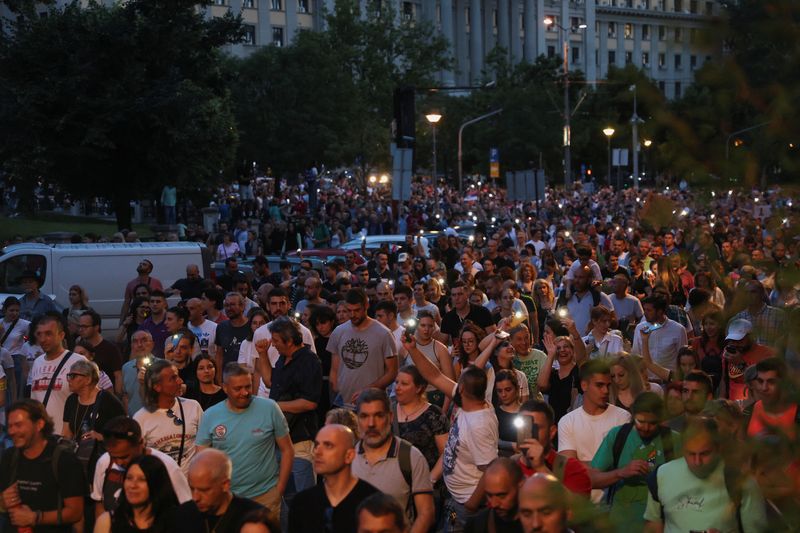Serbians take to streets in anti-government protests following mass shootings
2023.06.09 16:57
5/5

© Reuters. People attend a protest “Serbia against the violence” in reaction to the two mass shootings in the same week, that have shaken the country, in Belgrade, Serbia, June 9, 2023. REUTERS/Zorana Jevtic
2/5
BELGRADE (Reuters) – Tens of thousands of Serbians joined an anti-government protest in Belgrade on Friday for the sixth time since May 3, blaming a culture of violence for the deaths of 18 people in two mass shootings and calling on the interior minister to resign.
Chanting “(Serbian President Aleksandar) Vucic out!” and holding a big banner reading “Students against violence,” the protesters gathered in front of the parliament and marched to the government building.
Serbia was rocked last month by two unprecedented shootings that happened on consecutive days. On May 3, a teenager killed ten at an elementary school. On May 4, a 21-year-old man killed eight in a town near Belgrade.
Protesters are demanding the resignation of Serbia’s interior minister Bratislav Gasic and secret service chief Aleksandar Vulin, who they blame for failing to bring criminal groups to justice.
They also want the withdrawal of national broadcast licences for television channels Pink TV and Happy TV and a ban on some tabloids who they blame for promoting violence.
“I expect the protest to continue, because there is no other way,” said one of the protesters, who gave her name as Milica. “I think at one point the government will have to give in, this is a large number of people and eventually they will have to give in to this pressure.”
Prime Minister Ana Brnabic said on Wednesday she was willing to resign and invited the opposition parties – who have backed the protests – for dialogue. But protest leaders have said that they will not speak with the government until all their demands are met.
Vucic says his government is not at fault.
“Is the government to blame for crimes that happened? I cannot accept that,” he told Reuters on Friday.
Serbia has a deeply entrenched gun culture, and along with the rest of the Western Balkans is awash with military-grade weapons and ordnance in private hands after the wars of the 1990s that tore apart the former Yugoslavia. However, mass shootings are rare.








